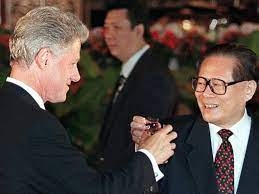LAST MONDAY Communist China asserted the right to invade Taiwan. Bill Clinton's diplomacy is bearing fruit.
The president's recent summit in China was graded by many a success because he had managed to speak about the Tiananmen Square massacre live on Chinese TV. In truth, Clinton's defense of human rights was far from stirring. (They promote "stability," he said.) And it was undercut by his soothing assurance that "there are legitimate and honest differences in the way we look at this." (We call it murder, you call it crowd-control — tomato, tomahto, potato, potahto.)
 President Bill Clinton and Chinese President Jiang Zemin toast each other during a banquet in the Great Hall of the People in Beijing. |
Clinton's Taiwan message, by contrast, came through loud and clear.
On July 1, speaking as if the lives of Taiwan's 21 million people were his to bargain away, Clinton uttered the "three no's" of Beijing's policy toward its tiny island neighbor. "We don't support independence for Taiwan," he said in a precisely worded exchange, "or two Chinas; or one Taiwan/one China. And we don't believe that Taiwan should be a member of any organization for which statehood is a requirement."
In other words, Taiwan belongs to China. This was a deep, deep kowtow, a thing no president had ever said. As a matter of law — the 1979 Taiwan Relations Act — and as a matter of principle, the American position had long been that Taiwan's political status was a matter to be resolved peacefully between Beijing and Taipei. The United States held open the door to any option, so long as it was reached without violence. In practical terms, this meant that the United States did not condemn Taiwan's efforts to establish sovereignty by winning diplomatic recognition. And it did not acquiesce in mainland China's claim of domination over Taiwan.
But Clinton's pronouncement, a parroting of Chinese policy, broke new ground. It was exactly what Jiang Zemin wanted to hear. It slammed the door on any future for Taiwan other than reabsorption into China. And it shined a green light that Beijing's tanks are figuratively — perhaps, literally — ready to roll through.
And so last Monday, in its first military policy review in three years, the Chinese state council repeated its determination to bring about reunification with Taiwan. "Beijing," the document stressed, "will not commit itself not to resort to force." For good measure, the Cabinet condemned "hegemonism" — the United States, in Communist-speak — as "the main source of threats to world peace and stability."
The Chinese government has had six years to take the measure of the Clinton administration. In November 1993, a meeting of China's senior foreign and military-policy specialists produced a detailed report that began: "Whom does the Communist Party of China regard as its international arch enemy? It is the United States." The administration reaction to this gauntlet-fling was not to begin treating Beijing as a deadly adversary, but to embark upon a frantic program of appeasement.
Most favored nation status was repeatedly renewed. Trade and human rights were "delinked." China was allowed to buy technology with dual-use applications, from supercomputers to satellite guidance systems. Hundreds of companies controlled by the People's Liberation Army were permitted on US soil. Naked violations of nuclear-proliferation agreements were winked at. And wads of illegal campaign contributions were cheerfully accepted by the president's political handlers.
Only once did the White House show a little resolve in the face of Chinese belligerence. In 1996, as Taiwan prepared to hold its first democratic election for president — thereby finalizing its transition to democracy — Beijing began a campaign of naked intimidation. It fired live missiles and practiced bombing runs off Taiwanese waters. The island's ports were closed; fallout shelters were hastily built. China warned America not to interfere, or Los Angeles might go up in a mushroom cloud. After dithering for months, Washington dispatched two aircraft carriers to the Strait of Taiwan. Even then, the administration refused to commit itself explicitly to Taiwan's defense. And it balked at sending the carriers through the strait.
Whatever reassurance those carriers secured for Taiwan in 1996, Clinton's "three no's" scuttled it away last month. Jiang and his fellow-despots have maneuvered the American president one step closer to delivering Taiwan into their hands. Or to looking the other way when Beijing decides to invade.
The president's kowtow does more than embolden the world's most powerful totalitarian power. It flies in the face of reality. For Taiwan is not China's. It is manifestly an independent nation. It is self-governing, it controls its territory, it manages its foreign relations, and it ranks among the world's leading economies. Above all, it is our friend, democratic and reliable. If the 20th century taught the West nothing else, hasn't it at least made clear what happens when great powers sacrifice their small friends in order to appease ravenous dictators?
(Jeff Jacoby is a columnist for The Boston Globe).
-- ## --
Follow Jeff Jacoby on Twitter.
Discuss his columns on Facebook.
Want to read more? Sign up for "Arguable," Jeff Jacoby's free weekly email newsletter.

